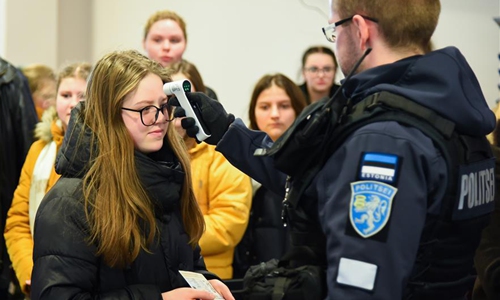
An Estonian border guard measures the temperature of a traveller at the border crossing with Russia in Narva, Estonia, March 9, 2020. Photo: Xinhua
While Russia is expected to enter its peak COVID-19 period in the following weeks, many Chinese students in Russia have chosen to stay, and some remain optimistic toward the country's upcoming battle.
On Saturday, 2,186 more people have tested positive for COVID-19, bringing Russia's total novel coronavirus confirmed cases to 15,770, Russia Today reported.
Veronika Skvortsova, the head of Russia's Federal Biomedical Agency, said the country would hit its COVID-19 peak within 14 days.
While some Chinese are leaving Russia and rushing home, making imported cases of the virus become a hot topic on social media, many Chinese students at Russian universities have remained calm.
"We filled several surveys to record our information and conditions from the Chinese embassy in Russia recently," a Chinese postgraduate student surnamed Sun at Bauman Moscow State Technical University, told the Global Times. "The embassy asked our intention of going back to China. Some of us even received calls from them." Sun said.
More than 200 Chinese students at the university who are staying in Moscow set up a WeChat group. Sun said that no Chinese student in Moscow had been infected with COVID-19 as far as he knows.
Sun also said he would not return to China because he is working on his graduation project. Although he is not worried about graduation, which should be in late June, it will probably be postponed.
"I hold an optimistic attitude toward the Russian government's top-down policies in the upcoming peak time of the outbreak," Sun said. "When the confirmed cases were still a few, Russia started to limit the border, then it suspended work places and schools."
"The daily life necessaties are normally supplied, and the online shopping delivery works as usual," he said.
Russia did not manage to avoid the outbreak imported from Europe. But after a period of strict administration and measures, it was able to gradually control the epidemic, Sun noted.
Sun and his Chinese roommates have stored face masks and dried food cans. Fortunately, online shopping still works in Moscow, so they order fresh vegetables and other groceries every three or four days.
Russian President Vladimir Putin extended the nationwide paid holiday to April 30, so that people could stay indoors.
Han Muyao at the National Research Nuclear University MEPhI (Moscow Engineering Physics Institute) told the Global Times that he really wants to return to China, but he chose to stay because the school has not announced its exam schedule.
Han has been taking online courses since the mid-March and has remained indoors since then.
Roughly 30,000 Chinese students studied at universities in Russia in 2017 and 2018, according to a survey by a Russian institute.
On March 26, Chinese Ambassador to Russia Zhang Hanhui held an online meeting with Chinese student representatives. Zhang said the embassy will work with local government departments to solve difficulties students may have with daily living, studying, and security.


